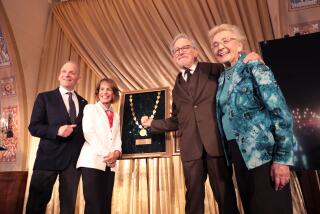Chemist Who Defected to Moscow Was at USC in ‘70s
- Share via
Arnold Lockshin, the American chemist who defected to the Soviet Union, performed important anti-cancer drug research at Los Angeles County/USC Cancer Research Center during the late 1970s, USC Medical School scientists said Thursday.
Lockshin’s work, involving enzymes, helped scientists to devise better cancer drugs and illuminated the mechanisms of drug resistance.
Lockshin also worked at Harvard University in the late 1960s. But he interrupted his research career from 1969 to 1977, working as a bookstore clerk, an editor and a writer, according to USC records.
Dr. Zoltan Tokes, a USC biochemist who knew Lockshin, described him as a “very congenial, no-nonsense, hard-working individual” who stayed in the lab late at night and “worried about his enzyme.”
Worked as Pharmacologist
At USC, Lockshin worked under Dr. Peter Danenberg, a biochemist widely recognized as an authority on drugs that inhibit enzymes involved in cancer.
While there, Lockshin was the lead author of three scientific papers dealing with an enzyme in cells that is the target of one of the first anti-cancer drugs used in the treatment of leukemia.
Lockshin, 47, who worked as a pharmacologist and chemist at St. Joseph Hospital in Houston from 1980 until his contract was terminated in August, surfaced in Moscow on Wednesday, accompanied by his wife Loreen and their three children. He contended in interviews with the Soviet media that he had fled the United States because authorities there were harassing him and his family for his political views and activities.
USC officials had said Wednesday that they had no record of his employment at the medical school. But Thursday, after a closer look at stored records, officials said that although he was never a faculty member, Lockshin had been employed at USC from July, 1977 to July, 1980, when he resigned to take the position in Houston.
Harvard Research Fellow
Margery Heffron, a spokeswoman for Harvard University, said that Lockshin was a research fellow at the school’s biology lab from October, 1968 to January, 1969, and then worked from February through June of 1969 as a lecturer in biology.
“During the time he was here he was a very good scientist,” Lawrence Bogorad, a Harvard professor of biology, said Thursday.
Lockshin graduated from high school in Richmond, Calif., in 1956, earned a BA in biochemistry from UC Berkeley in 1960, and received a Ph.D. in biochemistry from the University of Wisconsin in 1965, according to Peggy Rinard, a USC spokeswoman. From 1969 to 1972 he worked at the Bookmark Bookstore in Cleveland, Ohio, and the next five years he worked at Pacific Publishers in Los Angeles, Rinard said. Both businesses either no longer exist or have moved.
Lockshin’s father, Leo Lockshin, 78, of Richmond, told the San Francisco Chronicle on Wednesday that he feared his son “must be mentally disturbed.”
“It was unexpected and a terrible shock,” the elder Lockshin said. “I haven’t seen him in over a year. He (had) acted funny, and he works with chemicals, and I thought maybe he was using some of the chemicals.”
Times staff writer Tracey Kaplan in San Francisco also contributed to this story.
More to Read
Sign up for Essential California
The most important California stories and recommendations in your inbox every morning.
You may occasionally receive promotional content from the Los Angeles Times.













